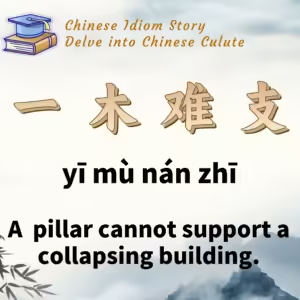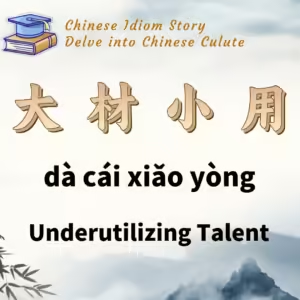
Chinese Idiom: 一木难支 or 独木难支 (Yi Mu Nan Zhi)
English Translation: One Pillar Cannot Support a Collapsing Building
pīn yīn: yī mù nán zhī
Idiom Meaning: A single pillar cannot support a collapsing building. This idiom describes a situation where, in times of extreme difficulty and crisis, the efforts of one person or a few people cannot save the situation.
Historical Source: “Book of the Northern Dynasties · Biography of Xiao Daocheng.”
Idiom Story: During the Northern and Southern Dynasties, Xiao Daocheng, a powerful general under Emperor Shun of the Song Dynasty, held political power and committed numerous atrocities. He killed loyal officials and had ambitions of usurping the throne. At that time, ministers Yuan Can and Liu Dong secretly plotted to kill Xiao Daocheng. However, their conspiracy was discovered by Xiao Daocheng’s associate, Chu Yuan, who informed Xiao Daocheng immediately. Furious, Xiao Daocheng dispatched his subordinate, Dai Sengjing, with a large force to attack Yuan Can, surrounding the city.
At this critical moment, Yuan Can said to his son Yuan Zui, “I know well that a single pillar cannot support a collapsing building, but for the sake of honor and righteousness, I must hold out.”
Later, Dai Sengjing’s troops breached the city walls, and in the face of enemy weapons, Yuan Zui bravely shielded his father with his own body. Yuan Can told his son, “I am a loyal minister, and you are a devoted son. We die without regret.”
Ultimately, both father and son sacrificed their lives for justice. The phrase Yuan Can used, “a single pillar cannot support a collapsing building,” became the idiom “one pillar cannot support a collapsing building,” reflecting the futility of their efforts in the face of overwhelming odds.






